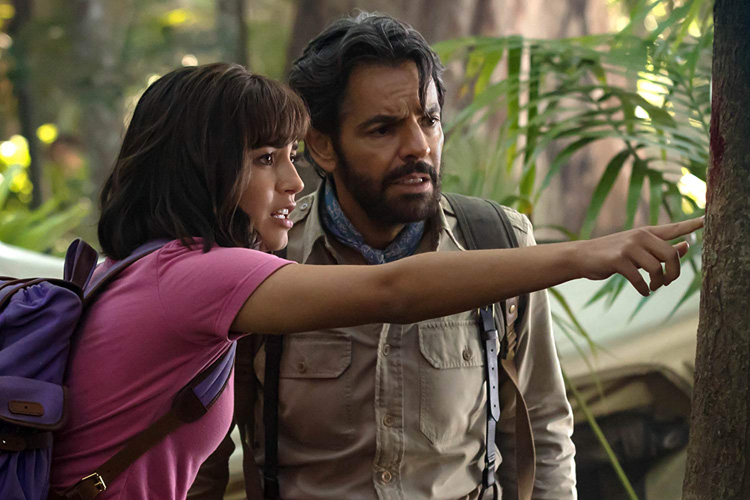I recently had the opportunity to sit down with Eugenio Derbez, an accomplished actor and comedian who Variety once called “the most influential Hispanic male in the entertainment industry”. He’s one of the stars of Dora and the Lost City of Gold, an adaptation of the famous children’s cartoon Dora the Explorer, opening in theaters this weekend. Our conversation has been edited for length.
***
Question: One of my favorite things about the movie is that Dora’s sort of an anti-Indiana Jones: instead of taking things from other cultures and bringing them to the West, she learns about them and keeps them where they should be. What do you think that’ll mean to kids growing up now, that their first adventurer is someone who learns from other cultures and doesn’t steal from them?
Eugenio Derbez: I think it’s one of the great lessons of the movie, to teach kids not to destroy things. I’m talking in any single level. For example, I have a five-year-old kid—a baby girl—and every time she goes near a flower, she wants to grab it. And one day I told her, “You can’t do this. She’s gonna die. And she has a family—look, this is her mother, her father, her cousins—she has a family! Just leave it there. Just watch her, talk to her, admire her; but you have to leave it here. Because if not, you’re gonna lose everything, and in the future, there’s not going to be any more flowers here.” She understood that so well, and that’s what we need to teach kids. It’s the same thing that Dora’s parents are telling her: we don’t have to steal; we’re not treasure hunters, we’re explorers. We’re here to see, and to document, and to tell the world about this amazingness in nature—not to destroy it. It’s not like, “let’s enjoy it for ourselves!” I think this is very important for the newer generations, especially in this time where there’s global warming and the environment needs so much help from us.
Question: Live-action adaptations are obviously a huge trend in Hollywood right now. For audiences that might be fatigued by this trend, what would you say to encourage them to see this film in particular?
Eugenio Derbez: Even me, I love the cartoon. The storyline in the cartoon is quite simple, honestly. It’s very simple. So if someone tells you, “let’s go watch Dora the Explorer”, it’s like, “really? It’s gonna be boring!” If I have kids, okay, but it’s gonna be like, “I have to take the kids.” But I think this movie is different. They really did a great job with the script: they made a more three-dimensional character; it has humor for everyone. The director is an amazing comedy director—James Bobin, he directed Flight of the Conchords, and that TV series was amazing! So he was constantly bringing jokes and jokes and jokes. Honestly, they cut at least thirty minutes of good jokes, because they wanted the movie to last no more than an hour and forty minutes. But there’s jokes for everyone, so if you go with your kids, or your abuelitas, or toddlers, or teenagers, whoever—they’re gonna enjoy the movie. And it makes fun of the cartoon: in the first three minutes, you understand that we’re mocking Dora, so it’s fun for everyone.
Question: Not only are you an actor in the film, you’re also one of the producers. Were you attached as an actor first, or did you come on as a producer and demand to be in the movie?
Eugenio Derbez: [Laughs] No, it came almost at the same time—when I heard about Dora, I told my agents I want to be part of this. I was always complaining that in Hollywood, they’re always portraying Latinos in a negative way. Every single movie, we’re the criminals, the drug lords, the narcos; and I wanted to change that in Hollywood as much as I could. And that’s why I started producing my own films. Because every time they call me, it’s for the same kind of roles. The only way to change this is to start producing my own stuff. When I was aware that this movie was in development, I told my agents I want to be part of this, because it’s a good way to portray Latinos on screen. And I know I can bring a lot of things to the table, because I was born and raised in Mexico—I’m a real Mexican. Five years ago, I was living in Mexico for my entire life. So I can help them with the Latino culture, about not making mistakes, about the Spanish, about many things. That way, my agents were able to put me in the project not only as an actor, but also as a producer. So basically I was in charge of supervising anything related to the Latino culture, and I also did the adaptation of the script into Spanish with one of my writers.
Question: Franchises are a big thing in Hollywood right now. With that in mind, especially being a producer of this film, have you already started talking about ideas for a Dora sequel?
Eugenio Derbez: Yes! Well, I—I don’t know if I’m supposed to say this, but I’m going to. You know, everything depends on box office. But I asked like three months ago if there was gonna be a Dora sequel, and they said it depends on the box office for sure, but the score—they do screenings for focus groups, and the numbers were really high. They were ninety-something. So they said they’re gonna start developing the script of Dora two, of the second part, pretty soon. So from what I’ve heard, they’re already developing something. Of course, it depends on the box office, but they already started to do that, yeah.




